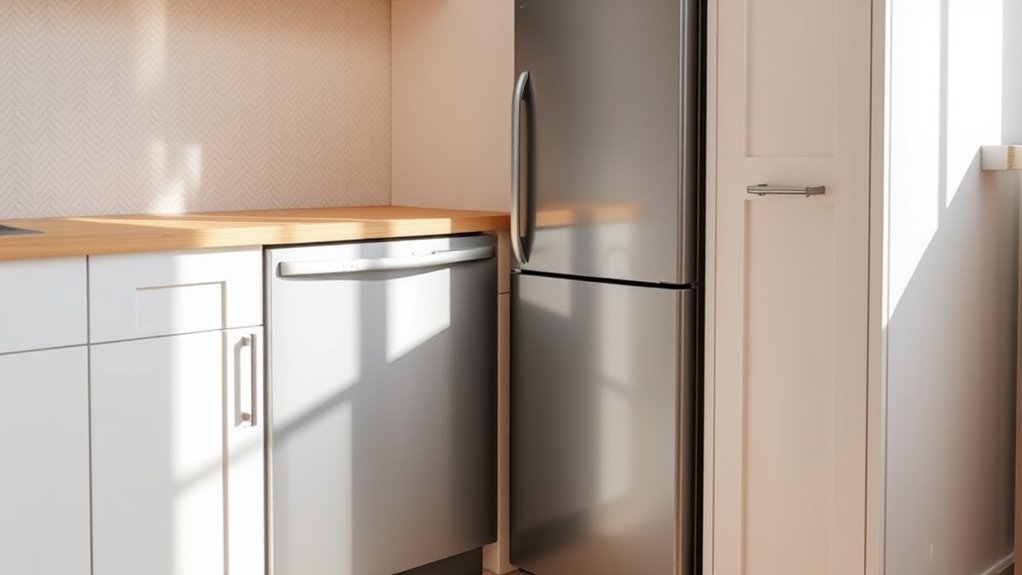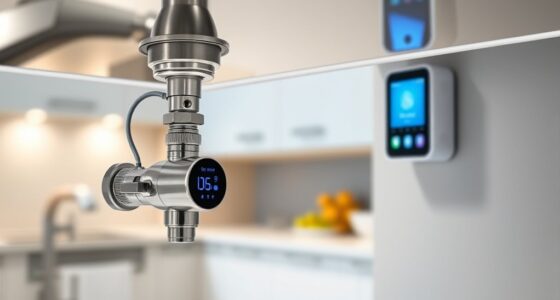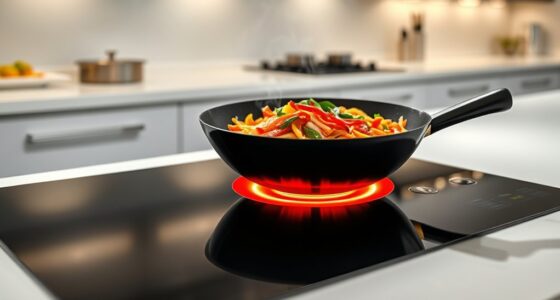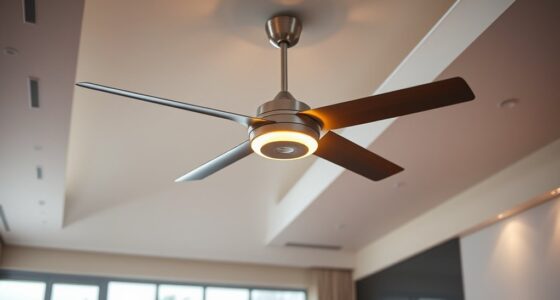To choose quiet appliances for small homes, look for models with low decibel ratings—ideally below 50 dB—and check their energy efficiency ratings like ENERGY STAR, which often indicate quieter operation. Place noisy appliances away from living and sleeping areas, and consider using soundproofing or vibration damping accessories. Prioritizing appliances with built-in soundproofing features and proper placement can make your home more peaceful—if you want to learn more, keep exploring these tips.
Key Takeaways
- Check appliance decibel ratings, aiming for models below 50 dB for quieter operation.
- Prioritize energy-efficient appliances, which often operate more quietly due to advanced technology.
- Position noisy appliances away from living and sleeping areas to minimize disturbance.
- Look for models with soundproofing, vibration dampers, and noise-reducing features.
- Regularly maintain appliances to prevent noise caused by malfunctioning or worn parts.
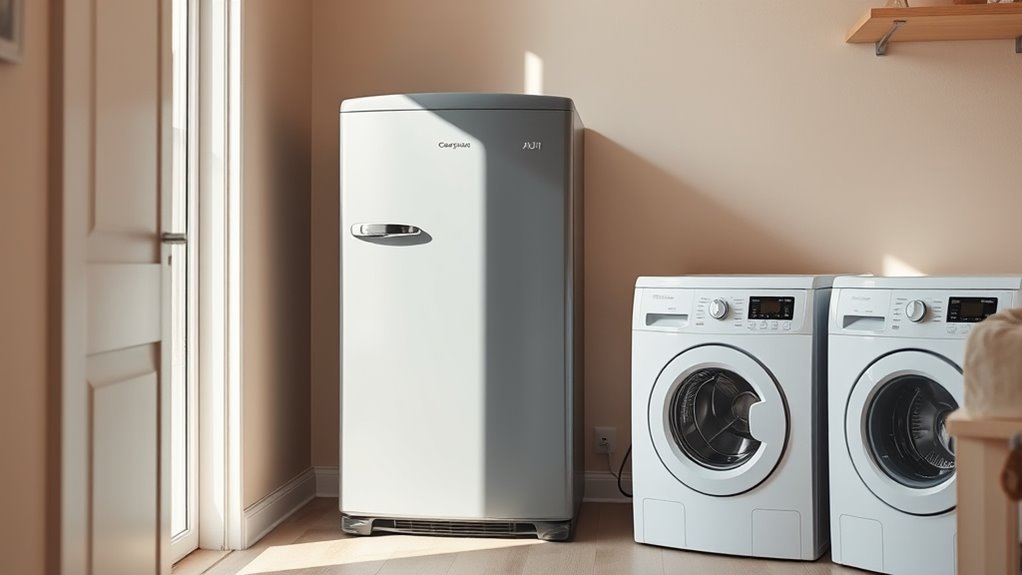
Living in a small home means every sound matters, especially when it comes to appliances that run frequently. You don’t want constant noise to disrupt your peace or interfere with daily activities. When choosing appliances, focus on their energy efficiency and noise ratings, which are key indicators of how quietly and efficiently they operate. Appliances with high energy efficiency not only save you money on utility bills but also tend to be designed with quieter operation in mind, since energy-efficient models often incorporate advanced technology to minimize sound. Noise ratings, usually measured in decibels (dB), give you a clear idea of how loud an appliance is. Look for appliances with lower decibel ratings—generally, anything below 50 dB is considered quite quiet, while models around 60 dB or higher tend to be noisier.
Start your search by paying close attention to these noise ratings. For example, many washing machines now specify their decibel level for spin cycles, which are often the loudest part of laundry day. A quiet washing machine with a low noise rating means you can run laundry early in the morning or late at night without disturbing your household. Similarly, dishwashers with good noise ratings operate smoothly without creating a loud, disruptive hum. When shopping for refrigerators or air conditioners, check their specifications for noise levels and opt for models that are designed to operate quietly, especially since these appliances run for extended periods.
Energy efficiency is also vital because it often correlates with quieter operation. Appliances labeled with high ENERGY STAR ratings are not only better for the environment but are also typically engineered to run more quietly. This is because manufacturers incorporate insulation and advanced motor technology to reduce noise and vibration. If you’re considering a range or oven, look for models with solid construction and noise-reducing features, as these will help keep your small home peaceful. Additionally, choosing appliances with soundproofing features can further enhance tranquility by damping vibrations and absorbing operational noise.
In addition to checking ratings, consider appliance placement. Positioning noisy appliances away from living or sleeping areas can make a significant difference. Use soundproofing materials or installation techniques to dampen vibrations and absorb sound, further reducing noise levels. Remember, the goal isn’t just to buy quiet appliances but to integrate them smartly into your space, maximizing both efficiency and tranquility. By focusing on energy efficiency and noise ratings, you’ll select appliances that maintain your small home’s serene atmosphere without sacrificing performance.
Frequently Asked Questions
How Do I Measure Appliance Noise Levels Accurately at Home?
To measure appliance noise levels accurately at home, use a sound measurement app or a decibel meter to gauge the decibel comparison. Place the device at your usual listening spot, about ear level, and turn on the appliance. Record the decibel reading, ensuring no other background noise influences the measurement. Comparing these readings helps you pick quieter appliances suitable for your small home environment.
Are Quiet Appliances More Energy-Efficient Than Standard Models?
Quiet appliances are often more energy-efficient because they use advanced noise reduction techniques that improve motor and compressor design, leading to less energy waste. While not always guaranteed, many quiet models prioritize energy savings to appeal to eco-conscious consumers. By choosing appliances that balance noise reduction with energy efficiency, you can enjoy a peaceful home and lower utility bills, making them a smart investment for small homes.
What Brands Offer the Quietest Appliances for Small Spaces?
You’ll find that brands like Bosch, Miele, and Samsung offer some of the quietest appliances for small spaces. When comparing brands, check their noise level ratings—look for models with decibel levels around 40-50 dB for minimal disturbance. Bosch excels in dishwashers, Miele in laundry, and Samsung in refrigerators. By reviewing brand comparisons and noise ratings, you can confidently choose appliances that keep your small home peaceful and functional.
Can I Retrofit Existing Appliances to Make Them Quieter?
You can definitely explore retrofit options and soundproofing techniques to make your existing appliances quieter. Adding insulation or mats beneath noisy machines helps dampen sound, while installing vibration pads reduces vibrations that create noise. Sealing gaps and using soundproof enclosures can also improve serenity. While it takes some effort, these modifications can transform your appliances into more peaceful members of your small home, letting you enjoy a calmer environment without replacing everything.
How Does Appliance Placement Affect Noise Levels in Small Homes?
Your appliance placement greatly impacts noise levels in small homes. Place noisy appliances away from bedrooms and living areas, ideally on interior walls or in cabinets with soundproofing techniques like insulation or mats. Use soundproof panels or seal gaps around appliances to reduce vibrations and noise transmission. Proper placement and soundproofing help contain sounds, making your space quieter and more comfortable without sacrificing functionality.
Conclusion
Choosing quiet appliances for your small home is like selecting gentle whispers amidst a lively room. By prioritizing sound levels and thoughtful placement, you create a peaceful sanctuary where everyday tasks feel more like a calming breeze than a loud interruption. With a little careful planning, your space becomes a cozy retreat, filled with soft hums rather than jarring noises. Embrace these mindful choices, and enjoy the serene comfort of your thoughtfully quieted home.
